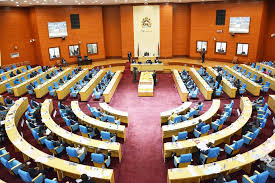Parliament has said it will retable the rejected electoral reforms Bills after the 21 days from the day of receipt of the Bills has elapsed in accordance with Section 73 (3) of the Constitution.
Assistant Clerk of Parliament responsible for Protocol and Public Relations Leonard Mengezi said this on Friday when he was clarifying the misconception that the public has on the communication Speaker of the National Assembly Catherine Gotani Hara made Thursday to the Constitutional Court (ConCourt).
The Speaker wrote the court through the Office of the Registrar of the High Court and Supreme Court of Appeal that it received communication from the President that he had rejected all the four Bills.
On February 3, the ConCourt made specific orders to Parliament to use its legislative powers to enact legislation for the electoral commission and stakeholders to abide by the Constitution in the conduct of presidential election in the country within a period of 21 days from the date of the judgement.

Hara indicated to the ConCourt the role Parliament played, which included passing of the bills the President has rejected.
The bills were meant to provide guidance on the conduct of fresh presidential elections as ordered by the ConCourt ruling in case of run-offs if one does not reach 50 percent +1.
But legal experts on Thursday faulted the Speaker for writing the court, saying the right procedure was to commence legal process.
In an interview Mengezi said Parliament has observed this misunderstanding saying the National Assembly is not party to the elections court proceedings.
“Therefore, our writing was not to move the court, but was meant to update the court on the progress the National Assembly was making regarding its directives,” he said.
Mengezi further said by reporting to the court they were not seeking an action and further, saying that as Parliament they will follow procedure in the current situation; hence, cannot discuss the Bills within the stipulated time until that time elapses.
“The National Assembly cannot debate the rejected Bills until after 21 days as stipulated in Section 73 (3) of the Constitution. This means the National Assembly will not meet to reconsider the Bills within 21 days from the date of the notification of the withholding of assent in this case on 14th March, 2020,”
“In this regard, the National Assembly might at its next meeting, re-table the Bills and reenact them. If that happens, the National Assembly will report once more to the court,” he said.
Commenting on the issue on his Facebook page, Chancellor College political analyst Henry Chingaipe said that there is nothing wrong with the Speaker giving a progress report to the court.
He said this is what is expected in parliamentary administration within the and division of functions’.scheme of ‘separation of powers
“The Speaker’s reporting to the Constitutional Court is good parliamentary administration. Parliament is informing another branch of government about progress on orders that were made on the basis of separation of powers and division of functions.
“The reporting is administrative. It does not amount to the Speaker suing the President. By the way, when Parliament passed the Bills, the Speaker similarly reported to the Constitutional Court,” he said.
Adding that Parliament will have to reconsider the Bills and the reasons the President has given for refusing to sign them off, saying that 21 days must elapse before Parliament can be called for this purpose as stipulated in the Constitution.
Last month, three Bills were presented in Parliament: The Private Members Bill (PMB) Number One of 2020, Constitution (Amendment), PBM 3, Parliamentary and Presidential Elections Act (PPEA) and the PBM 2 Electoral Commission Act (Amendment) Bills.


